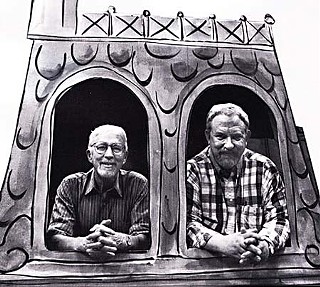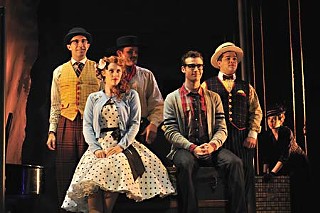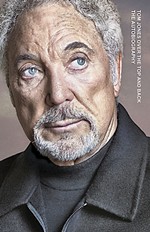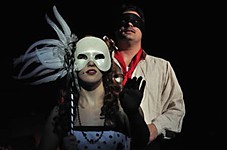Try To Remember
How two kids from UT changed the course of the American musical
By Robert Faires, Fri., Oct. 15, 2010
Hipsy-Boo! is not exactly a title that portends a career of earthshaking import in the fine arts. But what can you do, Posterity? That was the show in which Tom Jones and Harvey Schmidt first worked together, the initial step in their journey to a place of distinction in theatrical history: the creators of the longest-running musical anywhere ever, The Fantasticks.
In all fairness to these talented gentlemen, however, at the time they helped develop that musical survey of the 20th century's first half (the silly title coined by Schmidt to evoke the nonsense words of World War I-era popular songs and revues), they were still students at the University of Texas and had not even begun working as a team. In the spring of 1950, Jones was in his first year of graduate school in the Department of Drama, an aspiring director penning the comedy skits that would be stitched between the songs, and Schmidt was the undergrad art student tapped to be the show's musical director pretty much because he was the only person around who could play the piano. Even so, Hipsy-Boo! was an ambitious undertaking in which Jones, Schmidt, and their friend Word Baker, who would later stage the premiere of The Fantasticks, put their fledgling talents to the test and came up with a bona fide hit. The show sold out the 400-seat X Hall Theater and led to Jones being asked to direct the Journalism Department's annual revue, a job for which he recruited Schmidt to write music. One year after Hipsy-Boo!, Schmidt and Jones had actually collaborated as composer and lyricist on a by-God musical, and 10 years after, they opened The Fantasticks at the Sullivan Street Playhouse in New York City, where it continued to run for 17,162 performances. (Take that, Les Miz!)
Now, if all there was to The Fantasticks was a phenomenally long run, you could label it just another curious fluke in the theatrical record books – The Mousetrap with songs. But here was a show whose success was – and is – bound up in its difference from the great musicals of its day, its departure from the conventions of size and spectacle and embrace of a timelessness and intimacy all but unknown in the form then. At a time when the greatest hits of the American musical's golden age all boasted characters by the dozens, elaborate sets and costumes and choreographed dances, and stories rooted in very specific times and places (1906 Oklahoma, the South Pacific in World War II, small-town Iowa in 1912, Damon Runyon's New York City, King Arthur's Camelot), The Fantasticks dared to spin the story of neighboring fathers who conspire to draw their children together in a romance, a tale that could be of any time or any place and that it told using only eight actors, two musicians, and an almost bare stage. With its comfortable universality and simplicity of presentation, Jones and Schmidt's little musical felt anything but radical, but that's what it was, a major shift in direction for the form that offered new possibilities for what a musical could be. The success of The Fantasticks opened the door for more unconventional musicals in the Sixties and Seventies, those small of cast and unapologetic in their theatricality, shows from Schmidt and Jones' I Do! I Do! and Celebration to Stop the World, I Want To Get Off; Man of La Mancha; You're a Good Man, Charlie Brown; Godspell; and A Chorus Line. The show turned a page in the history of the musical, and all that is pioneering about it can be traced back to the creators' time at UT.
Of course, the world would have no Fantasticks without the partnership of Tom Jones and Harvey Schmidt, and it was the university where the two found each other. Both hailed from small towns in Texas, where they had no real outlets for their creative passions – theatre for Jones, music and art for Schmidt – and the big school deep in the heart of the state gave them opportunities to develop their talents and, because UT was a magnet for young people like them all across Texas, connect with others who hungered to create. Having been established in 1937, the College of Fine Arts was still fairly new when they arrived in the late Forties, and that may have actually contributed to the two crossing paths even though one was studying theatre and the other art. With the Department of Drama focused on classical training and producing no musicals, students who wanted to do a little singing and dancing onstage had to do it through the Curtain Club, a student group that had been mounting dramatic productions on campus since 1909. As it was for years the only place where students could indulge their theatrical impulses, the roster of Curtain Club alums contains many illustrious figures, in the performing arts but also other fields, among them Tex Ritter, Beauford Jester, Eli Wallach, Zachary Scott, Allan Shivers, Walter Cronkite, John and Nellie Connally, Allen Ludden, Pat Hingle, Barbara Barrie, Jayne Mansfield, Rip Torn, and Harry Blackstone Jr. That meant that students who couldn't participate in Drama Department shows could meet and make theatre with people who were drama majors, something that became virtually impossible in later years. So there was an opening for a guy who planned on being a commercial artist (and who did quite successfully, on top of being a renowned musical theatre composer) to work with a bunch of aspiring show folk.
And the way the Curtain Club was set up then, with weekly performances and big productions such as Hipsy-Boo! throughout the year, a pair of novices like Jones and Schmidt had a steady stream of opportunities for honing their skills. Schmidt recalls being constantly pulled aside by students who wanted to sing a number off a recent Broadway hit for these regular Wednesday night shows and wanted him to accompany them. Since he didn't read music, he would have to learn the pieces by ear, listening to the songs on the cast album over and over and working out the sound on the keys. He absorbed much of his understanding of composition through this painstaking process, which may have been partly why when Jones invited him to write music for the journalism revue Time Staggers On, he was primed and ready to compose. Indeed, 59 years later, Schmidt still considers "The Freshman Song," the opening number for that show, to be among the best songs he and Jones ever wrote. (The duo also consider the show, which included comic nudges at then-student reporter Liz Smith and Daily Texan Editor Ronnie Dugger, to be their biggest hit; it sold out the 1,200-seat Hogg Auditorium.)
That isn't to say that the Department of Drama played no role in laying the foundation for The Fantasticks. If not for Jones' time there, he and Schmidt might never have discovered the source material for their musical. Les Romanesques is already a pretty obscure little piece by Edmond Rostand, who's chiefly remembered for Cyrano de Bergerac, but the version to which Jones was exposed was more obscure still: a translation by an Englishwoman named Julia Constance Fletcher, who retitled it The Fantasticks. It hardly had a life when it was originally produced in 1900, but it was seen and admired by English director B. Iden Payne, who mounted a production with that title in 1909 and brought the text with him to UT when he began teaching there in 1946. He had his graduate students in directing stage a scene from it as an exercise. Something about it stayed with Jones, and years after he and Schmidt had both left UT, it resurfaced as a story with potential for musicalizing.
Ironically, in their first attempts at making The Fantasticks a musical, the team pursued the Rodgers and Hammerstein model, resetting Rostand's story in the American West, à la Oklahoma!, with the neighboring fathers becoming feuding ranchers more in the vein of Romeo and Juliet's Montague and Capulet, and the five-person cast expanded to include a nurse for the ingenue Luisa, two comic sidekicks for El Gallo, an old medicine show performer, a half-breed Apache as a villain, and a chorus of cowboys. (Jones initially embarked on the adaptation with another composer, John Donald Robb, and their Joy Comes to Deadhorse premiered at the University of New Mexico in 1956, but Jones found the result unsatisfying and tackled the project anew with Schmidt.) For three years, the team struggled to inflate this light souffle of a play into a meaty Broadway feast, but the play resisted them at every turn. It was only when their old Curtain Club compadre Word Baker offered them the chance to premiere a scaled-down version at Barnard College, where he was directing a group of original one-acts, that Jones and Schmidt abandoned the traditional show-bizzy approach and met the material on its own terms. As Jones wrote years later: "We threw away the entire script and score, except for a couple of songs. We decided to break all the rules. We didn't understand them anyway. For years, both Word and I had championed the idea of an 'open stage,' a presentational theatre which would exalt in theatrical devices rather than trying to hide them. This is what we would attempt. We would take all the things we liked about the theatre and try to throw them into one little one-act musical. After all, it was just for one week of summer stock. What did we have to lose?"
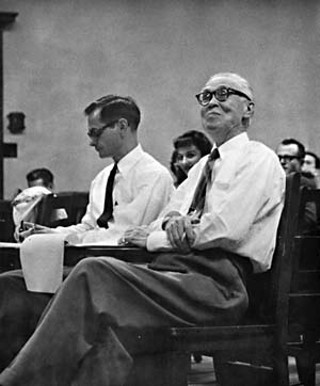
Nothing, as it turned out. The new approach proved liberating for both lyricist and composer, who created the new piece in only a month. Jones has cited various influences on The Fantasticks – Thornton Wilder's Our Town, a production of The Winter's Tale directed by John Houseman, commedia dell'arte, Leonard Bernstein's Candide – but none may figure more heavily than the "open stage" he refers to above, an approach that goes back to the lessons of B. Iden Payne, the man who not only introduced Jones to Les Romanesques but also schooled both him and Baker in the art and craft of direction. Drawing on his expertise in Elizabethan theatre, which was performed on a largely bare stage, Payne would insist that effective theatre did not depend upon extravagant sets or costumes; what mattered was story and character, clear presentation of the text, and stimulating the imagination of the audience. In creating The Fantasticks, Jones and Schmidt embraced Payne's principle to the fullest. (They also gave the great teacher a place in the show, using him as the inspiration for the character of the Old Actor.)
A producer named Lore Noto saw the Barnard production and liked it enough to offer to back a full-length version, and the rest, as they say, is history. Beyond the 42-year run in New York, The Fantasticks has been mounted more than 11,000 times across the United States and seen another 700-plus productions in 67 countries all over the globe. (Did you catch the production in Kabul, Afghanistan? How about the one in Beijing or Tehran or Zimbabwe?) Schmidt and Jones' alma mater is justifiably proud of their alumni's achievement, so this week the Department of Theatre & Dance is hosting a celebration of The Fantasticks' golden anniversary, with the two creators present and a host of activities involving other prominent graduates (see "'Fantasticks' Celebration Panels," below) and a new staging of Jones and Schmidt's breakthrough musical.
Rod Caspers, who is directing this new production for UT, sees in the musical's success story a connection to the current generation of students and a lesson. "This is the celebration of the 50th year of The Fantasticks," he says, "but more important to me is it's a celebration of what's possible. [I tell these kids:] 'Let's just stop and look at what happened to two young people who were doing the same thing you guys are doing. They had the same fears; they had the same dreams. They took the same classes. They walked the same paths. That is exciting.' And those kids go, 'That is exciting.' We need to stop and see that."
Dramatis Personae, The Jones/Schmidt Years
During the late Forties and early Fifties, a number of people studied at the University of Texas at Austin who would go on to national prominence in film, television, theatre, and journalism, and many of them moved in the same circles as Tom Jones and Harvey Schmidt. Here are some you may know, with the years they could be found on the 40 Acres. – R.F.
Word Baker, director, 1947-51
Robert Benton, screenwriter, 1950-53
Barbara Barrie, actor, 1948-52
Dabney Coleman, actor, 1950-53
Ronnie Dugger, journalist, 1948-51
Kathryn Grant Crosby, actor, 1951-55
Pat Hingle, actor, 1945-49
Tom Jones, director/lyricist/writer, 1945-51
Jayne Mansfield, actor, 1951
Fess Parker, actor, 1946-50
Harvey Schmidt, composer, 1948-52
Liz Smith, columnist, 1945-49
Rip Torn, actor, 1950-53
Ann Wedgeworth, actor, 1950-53
'Fantasticks' Celebration Panels
In conjunction with its celebration of the 50th anniversary of The Fantasticks and College of Fine Arts alumni Harvey Schmidt and Tom Jones, the Department of Theatre & Dance will host panel discussions with accomplished UT graduates covering the impact of new work, working in musical theatre on Broadway and off, lessons of show business, and careers outside theatre. These conversations, which are free and open to the public on a first-come, first-served basis, will be held Saturday, Oct. 16, in the B. Iden Payne Theatre and the Oscar G. Brockett Theatre inside the Winship Drama Building, 23rd & San Jacinto. Scheduled times and locations are below. For more information, visit www.finearts.utexas.edu/tad.
Keynote Panel: 'The Fantasticks' From Inception to Golden Anniversary
9:30-10:30am, Payne Theatre
Panelists: Tom Jones and Harvey Schmidt (lyricist and composer, The Fantasticks); moderator: Kathy Panoff (Texas Performing Arts)
Making It Happen: The Impact of New Work
11:15am-12:15pm, Payne Theatre
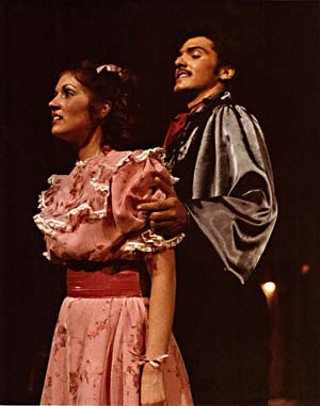
Panelists: Robert Schenkkan (Pulitzer Prize for Drama for The Kentucky Cycle), Kitty McNamee (artistic director, Hysterica Dance Company), Kim Peter Kovac (producing director, Kennedy Center Theater for Young Audiences), Carson Kreitzer (playwright, The Love Song of J. Robert Oppenheimer); moderator: Robert Faires (The Austin Chronicle)
The Big Picture: Careers Beyond the Theatre
11:15am-12:15pm, Brockett Theatre
Panelists: Jolynn Hoffman Free (senior vice president, RBC Wealth Management), Eric Glenn (founder, TxLobbyAssist Inc.), Dana Younger (founding partner, Blue Genie Art Industries); moderator: Francie Ostrower (UT Department of Theatre & Dance)
Lessons Learned: The Business of the Biz
1:30-2:30pm, Payne Theatre
Panelists: Brian Danner (director of stage combat, American Academy of Dramatic Arts Hollywood), Todd Lowe (actor, True Blood), Bruce McGill (actor, National Lampoon's Animal House); moderator: Michael Barnes (Austin American-Statesman)
Broadway and Beyond
1:30-2:30pm, Brockett Theatre
Panelists: Denny Berry (original dance captain, The Phantom of the Opera on Broadway), Jean Cheever (producer, The Toxic Avenger), Charlie Pollock (actor, 9 to 5: The Musical); moderator: Dave Steakley (Zach Theatre)
The Fantasticks runs Friday, Oct. 15, 8pm; Sunday, Oct. 17, 2 & 8pm; Wednesday-Friday, Oct. 20-22, 8pm; Sunday, Oct. 24, 2pm, in the B. Iden Payne Theatre, 23rd & San Jacinto, on the UT campus. For more information, call 477-6060 or visit www.finearts.utexas.edu/tad.






